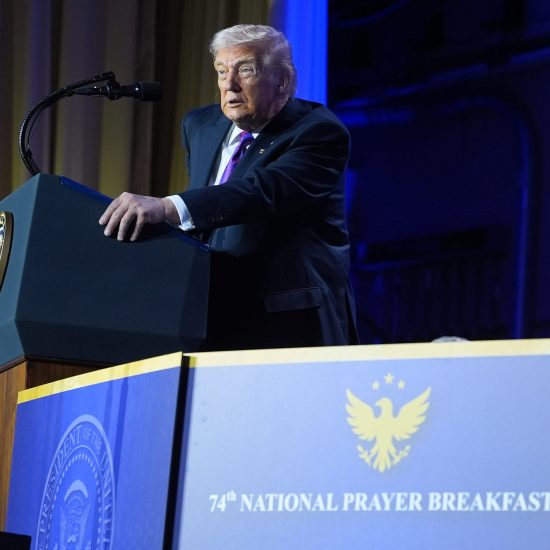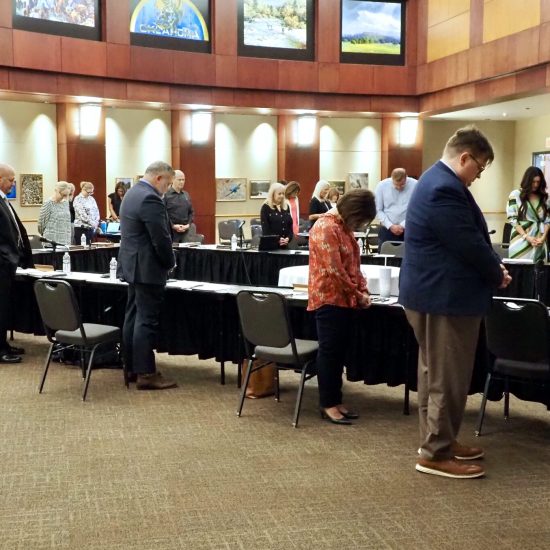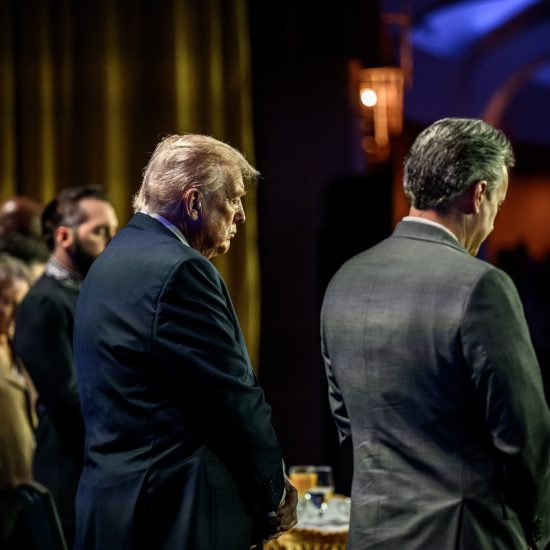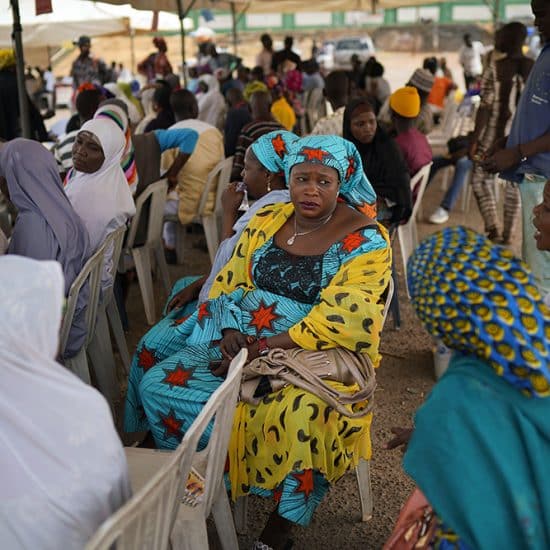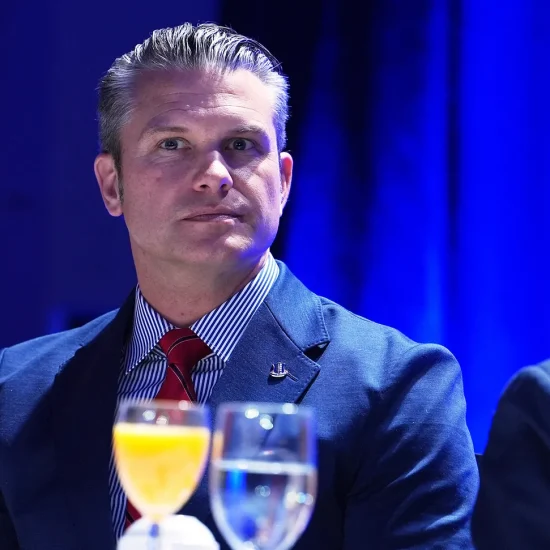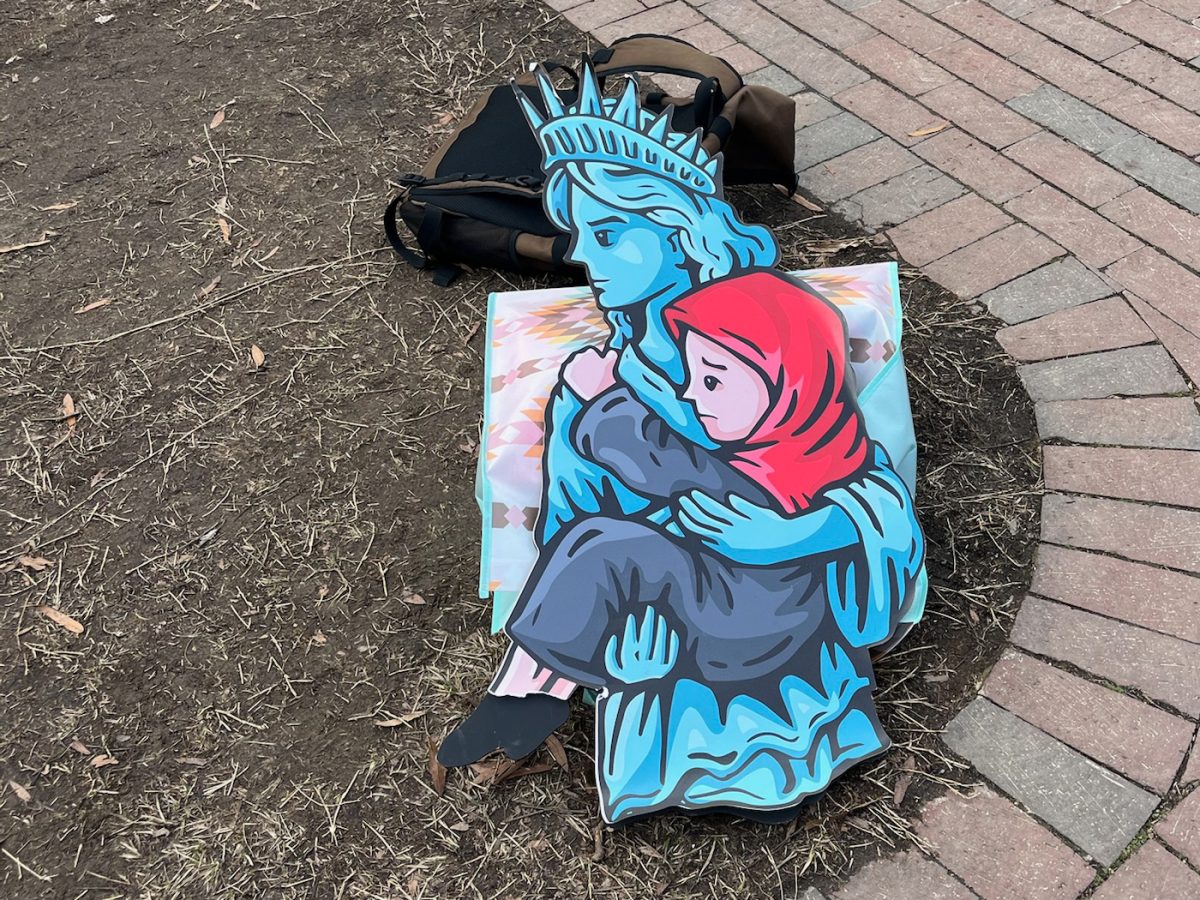
(RNS) — A federal judge has denied a request by the Trump administration to reconsider a ruling in a lawsuit brought by faith-based refugee resettlement agencies, ordering the government to begin immediately processing and admitting refugees who were conditionally approved before Jan 20.
In his ruling on Wednesday (April 9), U.S. District Judge Jamal Whitehead declared, “the Government must continue processing, admitting, and providing resettlement support to them — and funding (United States Refugee Admissions Program) partners to the extent necessary to do so— consistent with this Court’s previous order.”
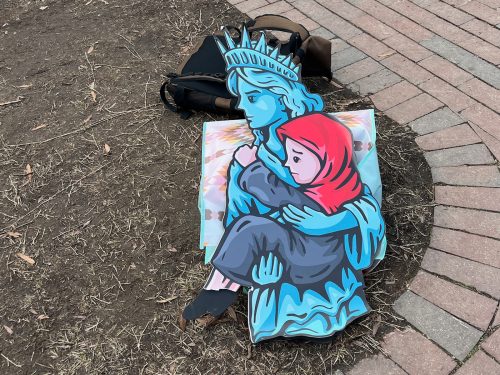
A depiction of a refugee being held by Lady Liberty during a protest in Washington, D.C., Tuesday, Feb. 4, 2025. (RNS photo/Aleja Hertzler-McCain)
Mark Hetfield, head of HIAS, a Jewish organization that works with refugee resettlement, and a plaintiff in the case, celebrated the ruling. “Even after multiple court actions have ordered their admission, the Trump Administration has sadistically forced them to linger in danger, anguish, and uncertainty. As we say on Passover, Dayeinu! That’s enough,” Hetfield told RNS by text.
He added, “We pray the government finally respects the court order as well as human dignity, and admits the thousands of refugees.”
The judge’s ruling follows weeks of courtroom clashes between the government and three religious groups — HIAS, Church World Service, and Lutheran Community Services Northwest — who are among the 10 organizations that have long partnered with the federal government on refugee resettlement. In all, seven of the organizations are faith-based — although the U.S. Conference of Catholic bishops recently announced it would no longer participate.
The latest chapter in the case, known as Pacito v. Trump, focuses on a trio of court orders issued over the past two months — two issued by Whitehead and a third originating from the 9th U.S. Circuit Court of Appeals.
The dispute began shortly after Trump took office in January, when he signed an executive order effectively freezing the U.S. refugee program and abruptly halting payments to organizations that assist with refugee resettlement. The change left refugees set to enter the U.S. in limbo, and the sudden lack of funds — including payments for work already performed, according to Church World Service — left the religious groups scrambling to find money to care for refugees who had recently arrived while also instituting mass layoffs.
The faith groups, along with several individual plaintiffs, promptly sued, and they won a victory in late February when Whitehead issued an injunction blocking the administration’s halt to the refugee program. But within a week, lawyers for the plaintiffs suggested the government was being slow to comply, prompting Whitehead to order the administration to produce a “status report” on its efforts to resume the programs. Whitehead also granted the plaintiffs a second preliminary injunction in late March, ordering the government to “reinstate all cooperative agreements” with the resettlement groups that were abruptly terminated in late February.
The government, meanwhile, appealed the initial injunction to the 9th U.S. Circuit Court of Appeals. The court partially denied the government’s motion to stay Whitehead’s ruling, but parties disagree on how to interpret the order: On Wednesday, government’s attorneys argued the 9th Circuit “largely said that the injunction needs to be paused,” whereas lawyers for the faith groups insisted Whitehead’s initial injunction should remain in effect for refugees who were conditionally approved as of Jan. 20 — a group that, lawyers for the faith groups said, likely includes “tens of thousands of people.”
Linda B. Evarts, a lawyer for the faith groups, argued the government’s lawyers “have made clear that they … have not and do not plan to comply with the court’s orders,” and she likened the legal battle to a game of “Whack-a-Mole.”
“It has now been a month and a half since the court issued its first preliminary injunction, and now defendants say that they do not have to comply not only with the first injunction, but also with the second injunction,” Evarts said.
Lawyers for the faith groups were even more strident in a brief filed shortly before the hearing.
“Defendants now admit that they are not complying and do not intend to comply with either of this Court’s preliminary injunctions,” the brief read. “To defend their open defiance, they splice together fragments of the Ninth Circuit’s stay order to assert an interpretation so tortured as to defy basic logic and erase this Court’s rulings from the books.”
Benjamin Mark Moss, who represented the government on Wednesday, rejected the allegation during the hearing, saying, “The government strongly disagrees with any suggestion that the government has been out of compliance.”
The ruling comes two days after an announcement from the U.S. Conference of Catholic Bishops that it would not seek to renew federal agreements to provide refugee resettlement and children’s services. Leaders at the USCCB, which is also embroiled in a separate legal battle with the government over refugee resettlement, called the decision “heartbreaking.”
“While this marks a painful end to a life-sustaining partnership with our government that has spanned decades across administrations of both political parties, it offers every Catholic an opportunity to search our hearts for new ways to assist,” the USCCB’s president, Archbishop Timothy Broglio, who leads the Archdiocese for the Military Services, said in a statement.
“We simply cannot sustain the work on our own at current levels or in current form.”
The cases have also proved turbulent for the litigators involved. Among the Trump administration lawyers who originally appeared before the court in Pacito v. Trump was August Flentje, acting director of the Office of Immigration Litigation. But Flentje was abruptly put on administrative leave over the past week for “failure to supervise a subordinate” — namely, Erez Reuveni, the office’s acting deputy director, who had also been abruptly put on leave by the Trump administration after he acknowledged in court that a Maryland man was deported to El Salvador in error.
Another government lawyer, Nancy K. Canter, withdrew from the case on Wednesday morning just hours before the hearing. A request for clarification on the reason for her departure was sent to the email associated with Canter; an automated response said she was “out of the office on extended leave” and directed inquiries to Flentje and Reuveni.
The Department of Justice did not respond to questions regarding her withdrawal.

